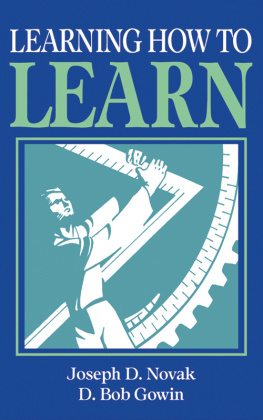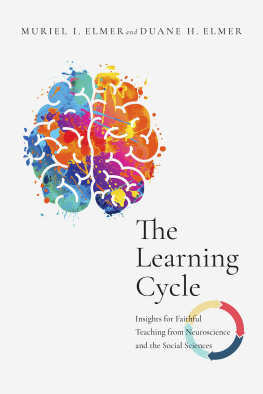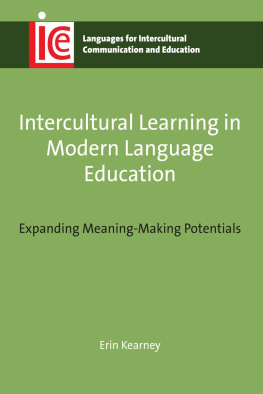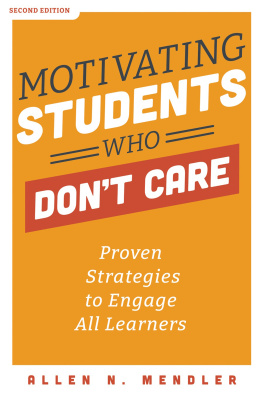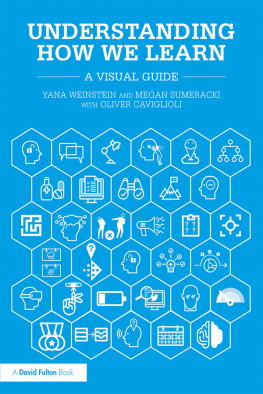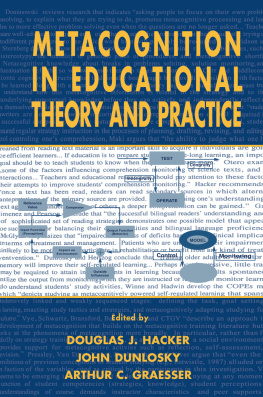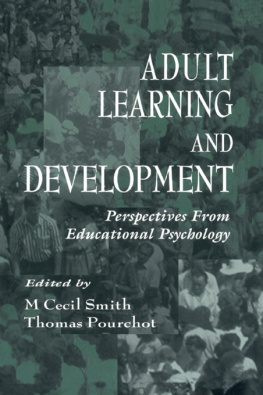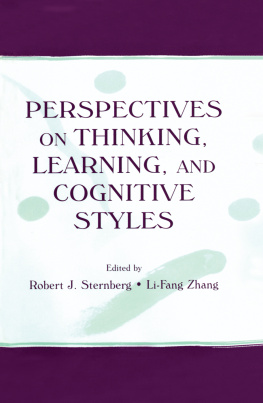LEARNING HOW TO LEARN
Learning how to learn
JOSEPH D. NOVAK AND D. BOB GOWIN
Department of Education
New York State College of
Agriculture and Life Sciences
Cornell University

CAMBRIDGE UNIVERSITY PRESS
Cambridge, New York, Melbourne, Madrid, Cape Town, Singapore,
So Paulo, Delhi, Dubai, Tokyo
Cambridge University Press
32 Avenue of the Americas, New York, NY 10013-2473, USA
www.cambridge.org
Information on this title: www.cambridge.org/9780521265072
Cambridge University Press 1984
This publication is in copyright. Subject to statutory exception and to the provisions of relevant collective licensing agreements, no reproduction of any part may take place without the written permission of Cambridge University Press.
First published 1984
23rd printing 2008
A catalog record for this publication is available from the British Library
ISBN 978-0-521-26507-2 Hardback
ISBN 978-0-521-31926-3 Paperback
Transferred to digital printing 2010
Cambridge University Press has no responsibility for the persistence or accuracy of URLs for external or third-party internet websites referred to in this publication, and does not guarantee that any content on such websites is, or will remain, accurate or appropriate. Information regarding prices, travel timetables and other factual information given in this work are correct at the time of first printing but Cambridge University Press does not guarantee the accuracy of such information thereafter.
FOREWORD
During the past year two aspects of my life have often been juxtaposed. As president of a national teaching association, I have served on state and national commissions concerned with clarifying the crises in science education and I have traveled the country discussing the identified crisis with classroom teachers. As a science educator concerned about how students, particularly female and minority students, learn, I have assessed and analyzed learning among black teenagers who used the constructs described within this book. What amazes me in retrospect is how and why those two activities were so separate, so distinct. Surely the first concern of the prestigious commissions and researchers, as well as the journalists who publicized their work, was how children learn. Yet neither in the headlines nor in the footnotes did I find references to meaningful learning to education. Rather, I read about training, testing, disciplining, and employing. Yet, shouldnt the science education of the children in my research help them think about the consequences of using a nuclear weapon as well as teach them how to read the operational manual and run the machine?
As the hoopla concerning the crisis fades and the work of rejuvenating education begins, I suggest that parents, teachers, administrators, and researchers read this book. It succinctly and clearly presents a view, a theory, of how children learn and, therefore, how teachers and others can help children think about science as well as other topics. Its ideas and techniques may be adopted for preschoolers when objects are conceptually ordered, or for theoretical physicists when findings are conceptually organized. In addition, the authors offer evidence that their propositions work, that children can learn how to learn.
Two of the constructs described and discussed in the book, Concept and Vee diagramming, augment learning by combining the theoretical with the practical, the unfamiliar with the familiar. The third one, clinical interviews, allows teachers and parents to assess such integration. Together they build a firm foundation for learning and for thinking.
Perhaps times are changing. Recently I gave a workshop, mandated by a states commission on education, for some rather reluctant science teachers. They were tired of unsolicited, external edicts about longer school days, fewer teacher aides, more student-centered laboratories, student and teacher competency tests, and differential teacher pay. Politely they listened to my summary of national reports; quietly they assessed texts with readability formulas; passively they evaluated computer software. But the atmosphere changed when I introduced concept mapping. Enthusiastically and eagerly, they sought more information on how children learn because they could relate the material to learning problems in their classrooms. I believe that changes will come not from legislators or commissioners, but from classroom teachers. Novak and Gowin relate learning with teaching in a way designed to help classroom teachers who, in turn, will educate our children.
Jane Butler Kahle
West Lafayette, Indiana
PREFACE
T HIS BOOK was written for all those who believe that learning can be more effective than it now is, either in schools or in any other educational setting. The work grows out of sixty years of the authors combined experience and research dealing with problems of educating in classroom and field settings.
For almost a century, students of education have suffered under the yoke of the behavioral psychologists, who see learning as synonymous with a change in behavior. We reject this view, and observe instead that learning by humans leads to a change in the meaning of experience. The fundamental question of this book is, How can we help individuals to reflect upon their experience and to construct new, more powerful meanings?
Furthermore, behavioral psychology, and much of currently popular cognitive science, neglects the significance of feelings. Human experience involves not only thinking and acting but also feeling, and it is only when all three are considered together that individuals can be empowered to enrich the meaning of their experience. All readers of this book have surely experienced sometime during their schooling the debilitating effect of an experience that threatened their self-image, their sense that Im OK. We have found repeatedly in our research studies that educational practices that do not lead learners to grasp the meaning of the learning task usually fail to give them confidence in their abilities and do nothing to enhance their sense of mastery over events. Whereas training programs can lead to desired behaviors such as answering math problems or spelling correctly, educational programs should provide learners with the basis for understanding why and how new knowledge is related to what they already know and give them the affective assurance that they have the capability to use this new knowledge in new contexts. Schooling is too often an assault on students egos because the rote, arbitrary, verbatim instruction so common in classrooms has few intrinsic rewards. Students who do seek meaning in such instruction often fail. For them, school is at best frustrating and at worst an ordeal in which they must suffer the ridicule of teachers, classmates, and sometimes parents. We commonly blame these victims for failing at rote learning, and categorize them as learning disabled or, more denigrating, school dropouts or simply losers. The cost of these failures, both to the individuals and to society, is enormous.
We have come to recognize that questions of learning cannot be addressed comprehensively unless we consider simultaneously questions dealing with three other commonplaces involved in education: teachers and how they teach, the structure of the knowledge that shapes the curriculum and how it is produced, and the social matrix, or governance, of the educational setting. In any episode of educating, all four must be considered. The strategies we present are designed to enhance educating by helping learners to learn about human learning, about the nature of knowledge and the construction of new knowledge, about strategies for better curriculum design, and the possibilities for governance of education that is liberating and empowering.
Next page
